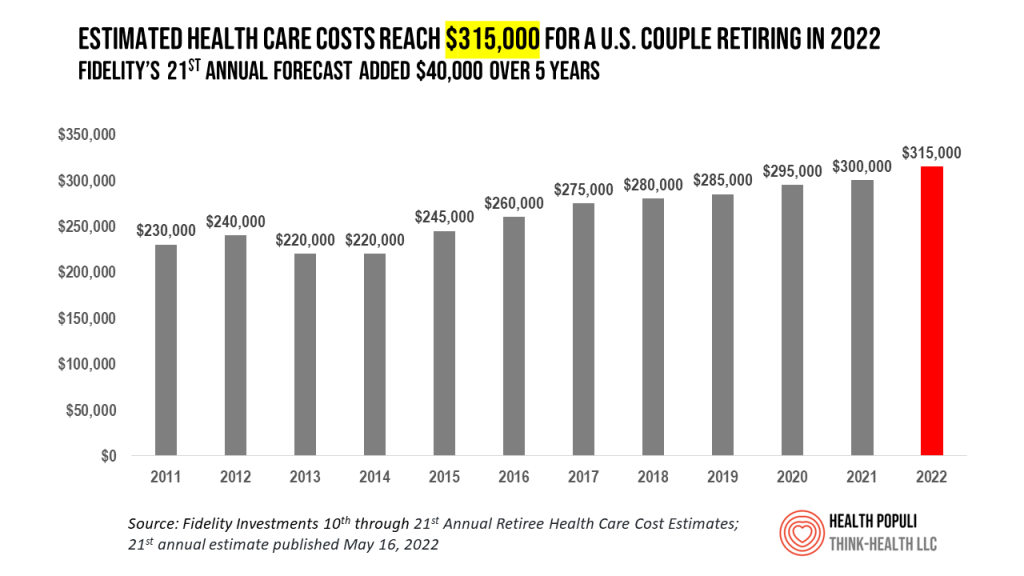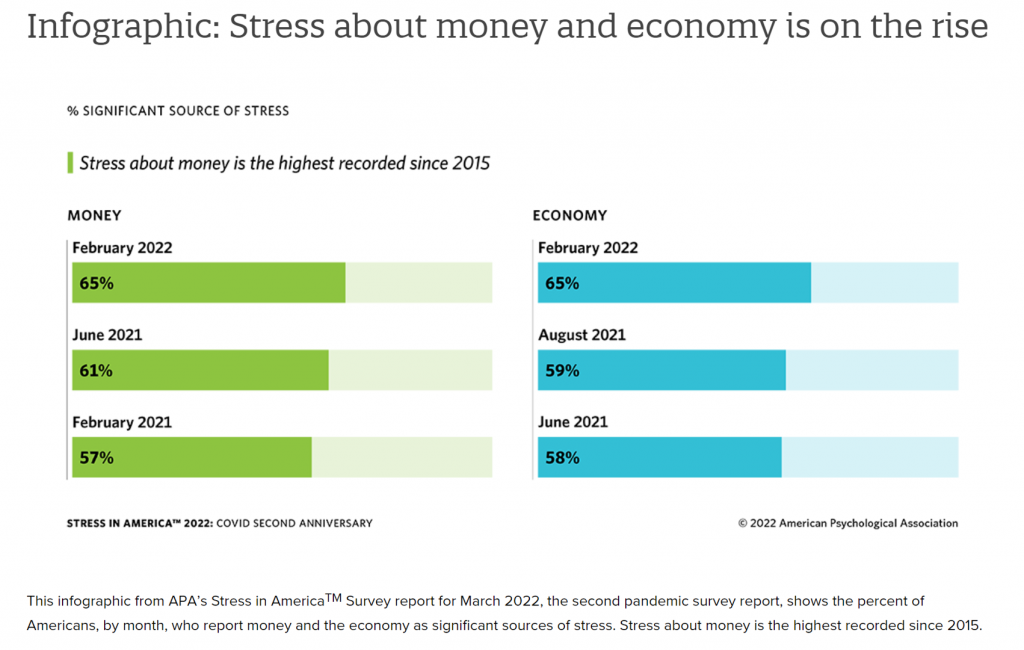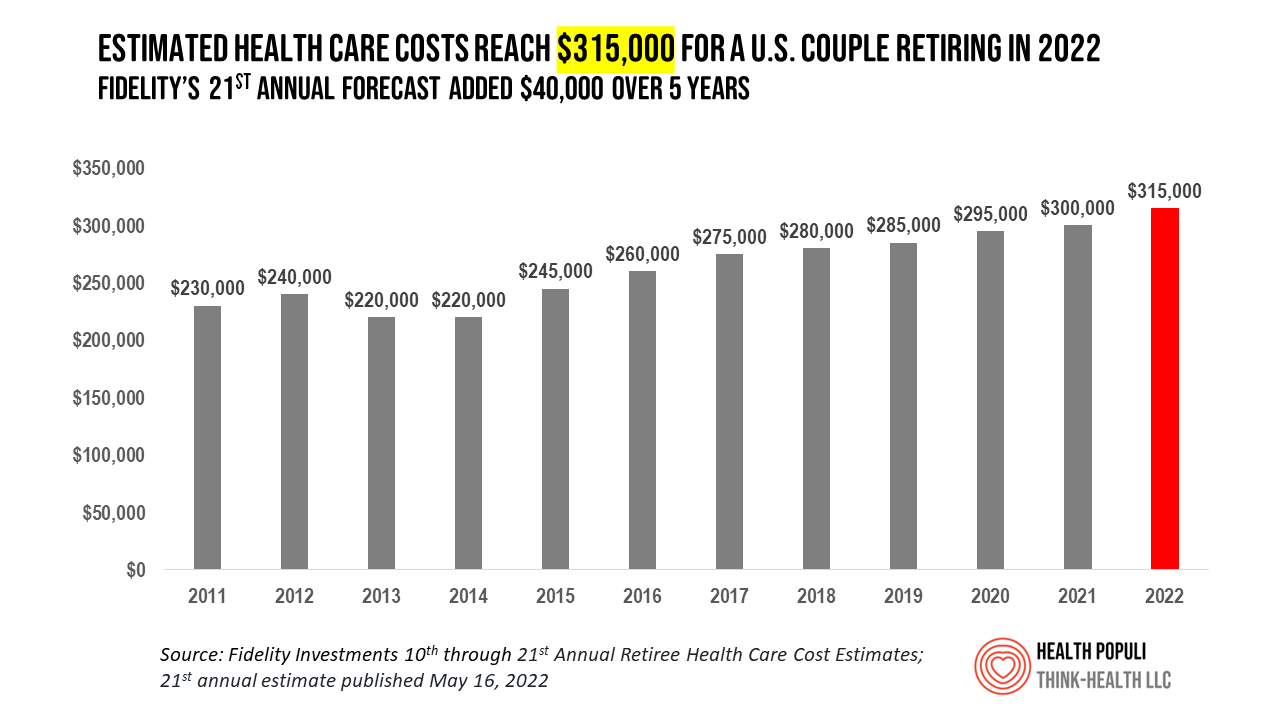A couple retiring in 2022 should budget $315,000 to cover their health care costs in retirement, based on the 21st annual Retiree Health Care Cost Estimate from Fidelity Investments.
For context, note that the median sales price of a home in the U.S. in April 2022 was $391,200.

It’s important to understand what the $315,000 for “health care costs” in retirement does not cover, explained in Fidelity’s footnoted methodology: the assumption is that the hypothetical opposite-sex couple is enrolled in Original Medicare (not Medicare Advantage), and the cost estimate does not include other health-related expenses including over-the-counter drugs, most dental care, and long-term care.
For additional context and potential sticker-shock, note that long-term care in the U.S. for one year would run about $120,000, on average, depending on a person’s geography and type of facility. according to Genworth’s 2021 Cost of Care Survey.
More granularly, Genworth quotes those long-term care costs as, on a median basis, as,
- $54,000 for an assisted living facility
- $61,776 for a home health aide, and $59,488 for homemaker services, and
- $108,405 for a private room in a skilled nursing facility.
Even without the LTC costs included, the $315K is seven times more than people expect they will have to pay for health care costs through their retirement, Fidelity calculated, observing that, “Americans are generally out of sync with the expected total cost of health care in retirement.
Peoples’ estimate was $41,000 for health care expenses in retirement, $274,000 less than Fidelity’s forecast.
The poll was conducted in February and March 2022 among 2,022 adults 18 years of age and older.
Health Populi’s Hot Points: Our financial health is tightly integrated with our physical, mental and emotional health. A person’s job and economic security have long been considered a pillar in the determinants of health, along with education, clean air and water, food/nutrition, social context and community and, indeed, health care system access.

In 2022, stress about money and the macro economy is growing across demographics. The American Psychological Association recently polled Americans in the perennial Stress in America study, finding that stress about money is the highest the APA has observed since 2015.
Two-thirds of people in the U.S. were stressed about money in February 2022 compared with 57% the year before. Similarly, 2 in 3 people were stressed about the economy in February 2022, versus 58% in June 2021.
A Bankrate and Psych Central survey from April 2022 found that for 42% of people, money negatively impacted their mental health. And 39% of U.S. consumers across all ages said that being unprepared for retirement caused a negative impact on their mental health.
Women were more likely to be negatively affected than men.
“The dramatic rise in the cost of essential goods and services is adding to the sense of personal economic insecurity,” the Bankrate/Psych Central write-up of the survey noted. “It is likely that money and personal finances are going to be a significant source of stress for many Americans.”
“If we can effectively prioritize emergency savings along with other financial goals, it may pay a double-edged dividend of both financial and mental well-being,” Mark Hamrick, senior economic analyst for Bankrate suggested.
That may be helpful advice for younger people with time on their side to put away spare cash if/when they can. But for people in the 50s and older, facing retirement sooner rather than later, the sticker-shock reality of a $315,000 price tag for health care costs will be a stress-inducing moment that could be long-lived.
From a Medicare sustainability perspective, check out Gail Wilensky’s latest essay (May 5) in JAMA on “The Future of Medicare Advantage.” A former director of Medicare and Medicaid, Wilensky rightly calls out concerns about pricing health care services and sustaining health care coverage for older Americans.
For Health Populi’s looks back on Fidelity’s annual survey on retiree health costs, here are some links to the studies going back a few years…
Retiree healthcare costs in 2021 $300,000
Retiree healthcare costs in 2019 $285,000
Retiree healthcare costs in 2017 $275,000
Retiree healthcare costs in 2016 $260,000
Retiree healthcare costs in 2009 $240,000
Retiree healthcare costs in 2008 $225,000





 I am so grateful to Tom Lawry for asking me to pen the foreword for his book, Health Care Nation,
I am so grateful to Tom Lawry for asking me to pen the foreword for his book, Health Care Nation,  I love sharing perspectives on what's shaping the future of health care, and appreciate the opportunity to be collaborating once again with Duke Corporate Education and a global client on 6th May. We'll be addressing some key pillars to consider in scenario planning such as growing consumerism in health care, technology (from AI to telehealth), climate change, and trust -- the key enabler for health engagement or dis-engagement and mis-information. I'm grateful to be affiliated with the corporate education provider
I love sharing perspectives on what's shaping the future of health care, and appreciate the opportunity to be collaborating once again with Duke Corporate Education and a global client on 6th May. We'll be addressing some key pillars to consider in scenario planning such as growing consumerism in health care, technology (from AI to telehealth), climate change, and trust -- the key enabler for health engagement or dis-engagement and mis-information. I'm grateful to be affiliated with the corporate education provider  Thank you FeedSpot for
Thank you FeedSpot for